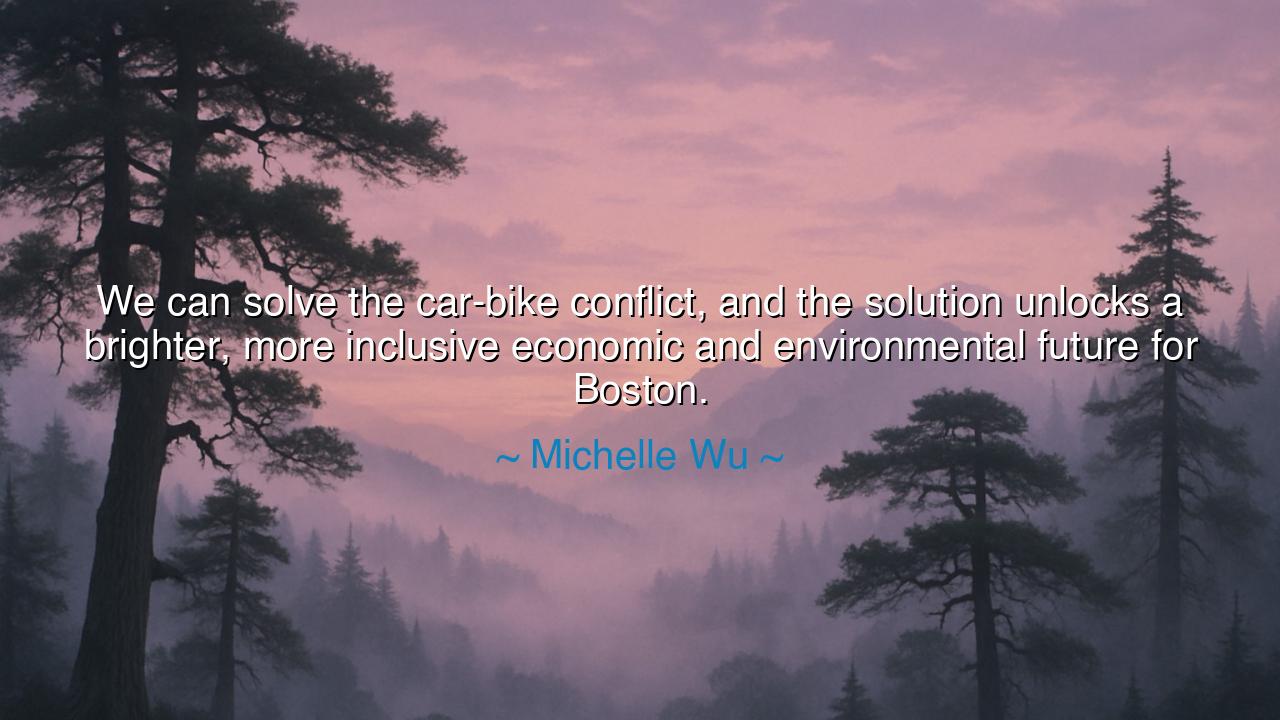
We can solve the car-bike conflict, and the solution unlocks a
We can solve the car-bike conflict, and the solution unlocks a brighter, more inclusive economic and environmental future for Boston.






In the words of Michelle Wu, “We can solve the car-bike conflict, and the solution unlocks a brighter, more inclusive economic and environmental future for Boston.” This is no simple utterance; it is a vision wrapped in wisdom, a call to arms for a city caught between the iron chariots of the modern age and the humble, human-powered steed of the common rider. In these words, we see not only a plan for roads and rails, but also a moral truth: that how we shape our streets reveals how we shape our hearts.
The ancients often taught that conflict is not eternal, but a veil awaiting the courage of men and women to lift it. The car-bike conflict is such a veil—two modes of travel, one thundering with engines, the other gliding with breath and pedal, forced into rivalry upon the narrow ways of the city. Yet the words of Wu proclaim that harmony is possible. She speaks not merely of traffic lanes, but of the spirit of coexistence. For when we learn to share the paths of earth with fairness, we learn too to share the burdens of life.
Consider the great polis of Athens, where the agora thrived not because chariots crushed all beneath their wheels, but because men walked side by side, traders mingled with philosophers, and the streets were sanctified by common use. So too must Boston remember: the city prospers when the weak are not cast aside by the strong, when the swift do not trample the steady, and when progress is measured not in speed alone, but in the inclusiveness of the journey.
A tale comes to us from Copenhagen, the northern city where once cars held dominion, choking air and space alike. Yet in time, the people demanded change, and leaders reshaped the streets to welcome bicycles in their thousands. The city was transformed—its air grew purer, its streets more vibrant, its people healthier and freer. What was once seen as sacrifice became blessing, as the city discovered that wealth is not only of coin, but of time, health, and fellowship. So too could Boston awaken to this truth, if its people heed Wu’s call.
The economic future Wu envisions is not merely of markets and trade, but of shared prosperity. When a city invests in safe paths for bicycles, it reduces the burdens of sickness, of pollution, of traffic delay. The worker arrives at their labor with clearer mind and stronger body; the family spends less upon fuel and more upon food; the marketplace thrives when access is open to all, not only to those who own the iron carriage. Thus the balance of city life shifts toward abundance.
And what of the environmental future? The earth groans beneath the smoke of countless engines. To lessen their number is to honor the covenant we hold with creation itself. The bicycle is humble, yet noble; it consumes not the earth’s oil, nor does it choke the sky with fumes. Each rider upon two wheels is a guardian of tomorrow, a silent warrior who protects the city not with shield and spear, but with choice and courage. Wu’s words remind us that this future belongs not to the few, but to all who dare to change their ways.
Let this, then, be the teaching: conflict can be solved not by domination, but by integration; not by silencing one voice, but by weaving many into harmony. The car and the bicycle need not be enemies, just as the young and old, the rich and poor, need not be divided. A brighter Boston awaits if we choose patience, planning, and vision.
To those who listen: walk or ride where you can. Speak with kindness to those who share the road. Advocate for paths of safety in your community, for the voice of one can echo into the chorus of many. In doing so, you honor both the city and the earth. For as the ancients taught, the greatness of a people is not measured by their monuments of stone or iron, but by the ways they walk together upon the earth.






AAdministratorAdministrator
Welcome, honored guests. Please leave a comment, we will respond soon